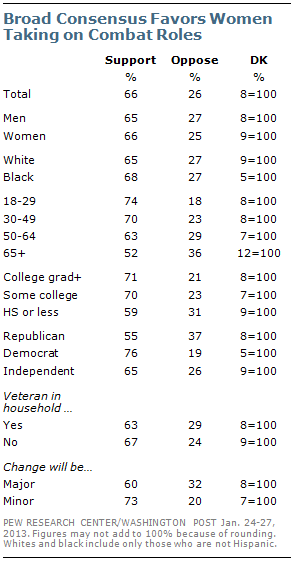Overview
 The public broadly supports the military’s decision to lift restrictions on women in combat. Two-thirds (66%) support allowing women in the military to serve in ground units that engage in close combat, while just 26% are opposed. Opinion on this question is little changed from a Washington Post/ABC News survey two years ago.
The public broadly supports the military’s decision to lift restrictions on women in combat. Two-thirds (66%) support allowing women in the military to serve in ground units that engage in close combat, while just 26% are opposed. Opinion on this question is little changed from a Washington Post/ABC News survey two years ago.
The latest national survey by the Pew Research Center for the People & the Press and The Washington Post, conducted Jan. 24-27 among 1,005 adults, finds that the public is evenly divided over whether allowing women to take on combat roles represents a major change for the U.S. military: 47% say it is, while an equal percentage says this is just a minor change.
The survey, conducted after Defense Secretary Leon Panetta ended the ban on women serving in ground combat units, finds that most Americans (58%) think that the policy shift will improve opportunities for women in the military.
By contrast, fewer think the decision will have an impact on military effectiveness. Nearly half (49%) say allowing women to serve in combat roles will not make much difference to military effectiveness; among those who say it will have an impact, nearly twice as many say this will make military effectiveness better (29%) rather than worse (15%).
Men, Women Equally Supportive of Lifting Combat Ban
Majorities of nearly all demographic groups offer support for allowing women to serve in ground units that engage in close combat.  Notably, almost identical percentages of men (65%) and women (66%) support the change.
Notably, almost identical percentages of men (65%) and women (66%) support the change.
About three-quarters of Democrats (76%) support allowing women in combat roles, as do 65% of independents. Republicans also favor the change in military policy, but by a much narrower 55%-37% margin.
Older Americans are less supportive of the change in military policy than younger Americans. Among those 65 and older, 52% support the decision while 36% are opposed. By contrast, more than seven-in-ten of those younger than 50 (72%) support allowing women to serve in combat roles.
There is little difference in views among those who live in a household with someone who has served in the military and those who do not. Overall, 63% of those in veteran households favor the decision compared with 67% of those in non-veteran households.
However, those who view the introduction of women into combat roles as a major change are less likely than those who see it as a minor change to support the policy (60% vs. 73%).
Views of Policy Impact on Effectiveness, Women’s Opportunities
 A 49% plurality says allowing women to serve in combat roles will not make much difference in terms of military effectiveness. Of those who do think there will be an impact, more say women in combat roles will make military effectiveness better (29%) than worse (15%).
A 49% plurality says allowing women to serve in combat roles will not make much difference in terms of military effectiveness. Of those who do think there will be an impact, more say women in combat roles will make military effectiveness better (29%) than worse (15%).
Far more Democrats say the change will improve military effectiveness (38%) than worsen it (7%); 52% say it will not make much difference. By contrast, more Republicans say women in combat roles will have a negative effect on military effectiveness (29%) than make it better (20%); 41% say things will not be much different.
Those in military households have a more skeptical view of the impact on military effectiveness than do those in non-military households.
Among those who say they or someone in their household has served in the military, 26% say allowing women in combat roles will improve effectiveness while about as many (22%) say it will make it worse; 44% say it will not make much difference. Among those in non-military households, more than twice as many say the policy shift will have a positive effect (31%) than negative effect (12%); 52% say it will not make much difference.
The change in military policy is widely seen as having a positive impact on opportunities for women in the military. A broad 58% majority says allowing women to serve in combat roles will lead to better opportunities for women in the military, 30% say it will not make much difference and only 7% say it will make opportunities worse.
Those in both military (56%) and non-military (59%) households say the change in military policy will make opportunities for women better. However, Republicans (46%) are less likely than independents (59%) or Democrats (67%) to say the change will improve opportunities for women in the military.


